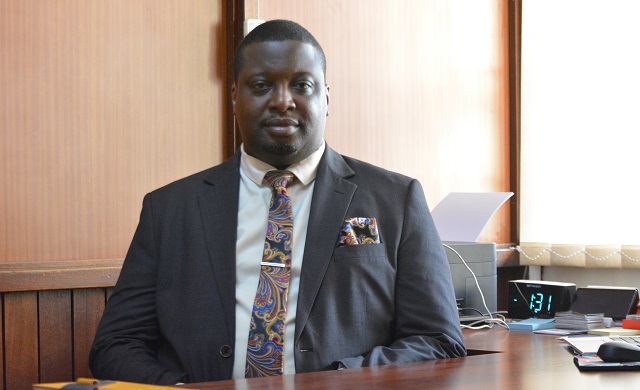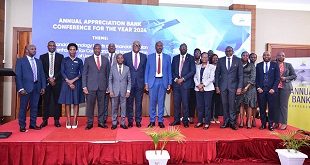
Kampala, Uganda | THE INDEPENDENT | Uganda Chamber of Mines and Petroleum (UCMP) Board appointed Mr. Humphrey Asiimwe as the new Chief Executive Officer effective March 1, 2023. He spoke to JULIUS BUSINGE about his management philosophy, plans for the organization, and the two sectors; excerpts:
It is slightly over four months since you took over as CEO of UCMP, what have you observed so far?
I am not new to UCMP. I have been part of the Chamber as a member for many years. However, as CEO, so far, I have been able to interact with many sector players in government and its agencies and with our members. We need to continue building capacity and skills for our local companies to benefit from the two sectors.
Employees in many organisations find it somehow hard to adapt to the management ethos of new CEOs. How is the situation at UCMP?
There have not been any complaints from staff in regard to your question. We work as a team and every one of us knows what our deliverables are and when to accomplish them. I believe in teamwork, self-supervision, and meeting deadlines. The team is competent to handle the business of the Chamber from the Research & development aspect to policy analysis, media and communication, membership, and strategy development.
Why should one be bothered about the work of UCMP?
For starters, UCMP was started in 2010. We are a not-for-profit membership organization that represents the interests of private-sector players in the mining and petroleum sector. UCMP coordinates and facilitates information sharing, and advisory to prospective and current investors in the mining and petroleum sectors in Uganda. It also promotes, encourages, protects, and fosters responsible mining, beneficiation, and service delivery in these sectors.
What has UCMP registered as core achievements since its inception in 2010?
We have built our membership from zero to now over 160. We have shared knowledge through our periodical magazines and other channels of communication. We have advised the government on key policy and legal frameworks for the oil and gas and mining sectors. We have published about 23 magazines, accomplished 44 projects, and won seven plus awards.
What is UCMP doing in line with complaints regarding the unsustainable extraction of minerals in the country?
A few years ago, President Yoweri Museveni banned the export of unrefined mineral ores and concentrates – which reinforced the conversation on how to sustainably improve the performance of the mining sector. UCMP appreciates the President’s position and is consistently engaging with him on the practical roadmap that will stimulate the growth of the sector in a sustainable manner.
The 2022 Mining Act legalizes the operations of artisanal and small-scale miners. What opportunities will this create for sector players?
It is very difficult to work with an illegal group. The UCMP put in a lot of effort to ensure that artisanal miners are recognized through their associations in the new law. We have a total of 35, 000. If well organized, they will improve the performance of the mining sector.
There seems to be a lot of talk about Uganda’s economy growing faster partly because of the oil and gas developments. What’s your comment on that?
That is true now that we have a very strong legal and regulatory framework. We are optimistic that in the next 3-5 years, with the signing of FID, the US$15-20billion dollars investment (or 50% of Uganda’s GDP), will boost the growth of the economy. In the budget speech for FY2023/2024, Finance Minister Matia Kasaija says, generally, the growth of the economy from 4.6% in FY2021/2022 to 5.5% in FY2022/2023 was partly attributed to developments in the oil and gas sector. What we are calling for is giving contracts to Ugandan companies because they have over time built the capacity to serve the oil and gas sector. Our budget needs to fund key infrastructure like the East African Crude Oil Pipeline, Kabalega International Airport, the Refinery, Roads, electricity, and human capital development sector.
Are you happy with the local content story as we speak?
Yes, I am but more needs to come through. I have seen numbers from the Petroleum Authority of Uganda indicating that about 73% of the companies, equivalent to 460 out of 624 involved in supplying the sector have been Ugandan. More than US$988,650 have been channeled to the community economy in exchange for the provision of goods and services. As of the end of May, 11,670 people had been employed directly with local citizens taking more than 93% of the jobs. That is good to start with given that the FID was reached last year in February.
Where do you see the future of the mining and petroleum sectors in Uganda?
The mining sector is going to grow now that we are working with the recently enacted Mining Law/Act of 2022. Under the new law, the Minister got the power to do licensing as opposed to the old setting when the commissioner was performing this role. The Act disbanded the Mineral Police Unit; introduced the formation of Uganda Mining Company; it recognised artisanal and small-scale mining licenses and more. All these developments will accelerate the subsector’s growth. For oil and gas, we are going to see a lot of investment coming through and contributing to the growth of the economy.
 The Independent Uganda: You get the Truth we Pay the Price
The Independent Uganda: You get the Truth we Pay the Price


